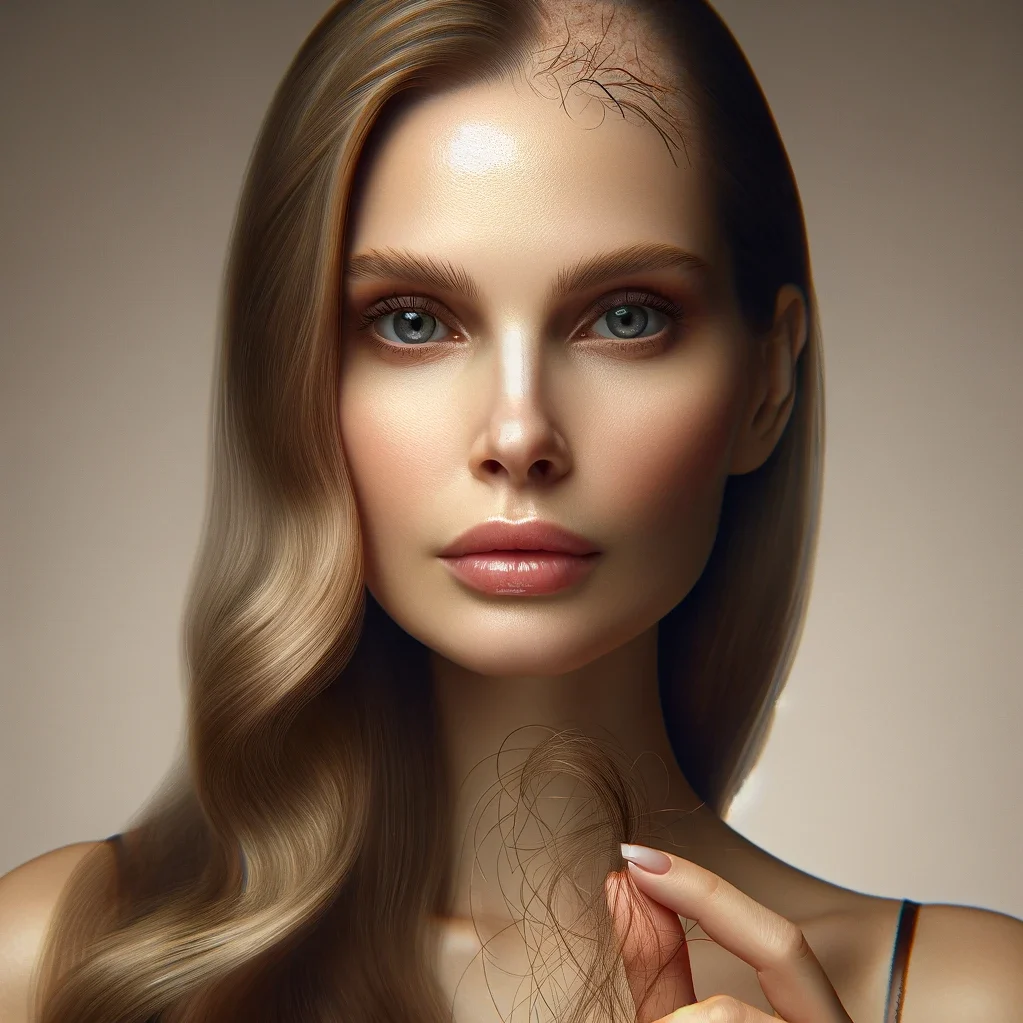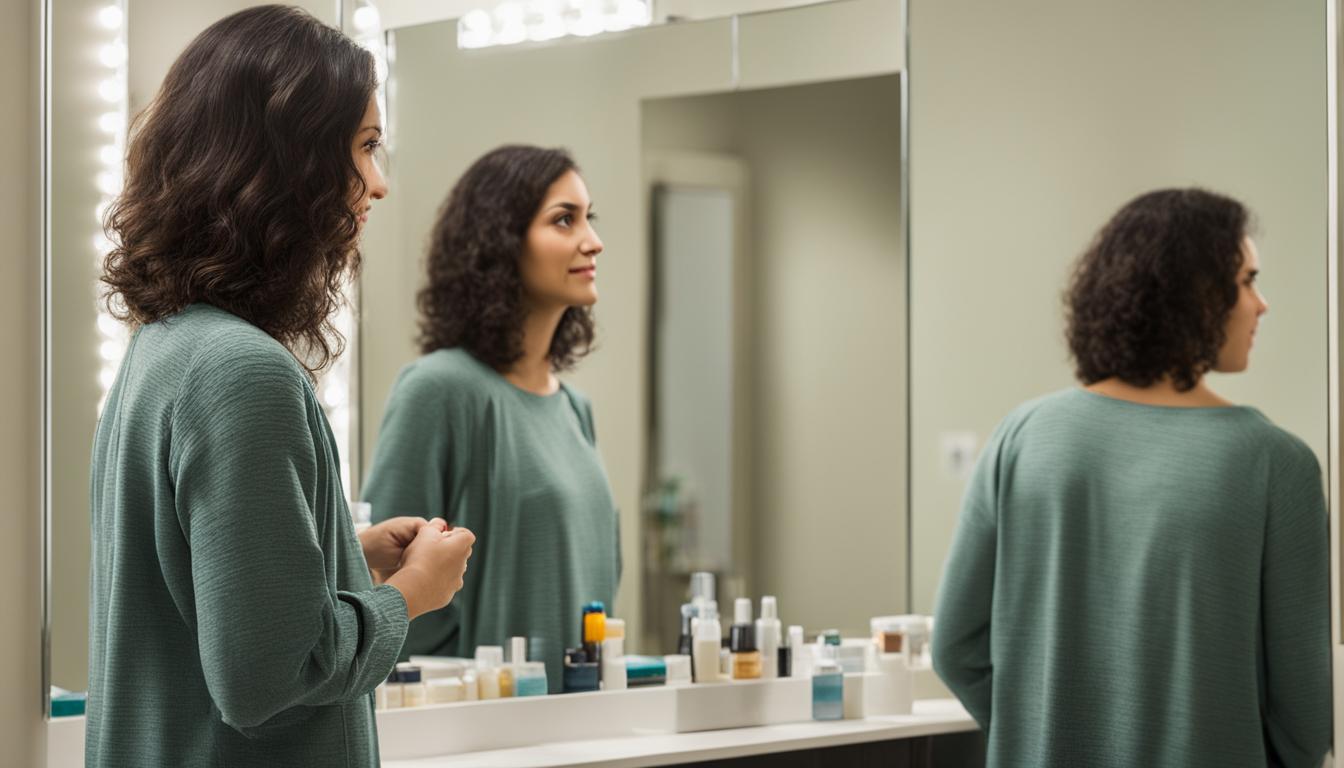Did you know that hair loss affects approximately 50 million men and 30 million women in the United States alone? If you’re experiencing thinning hair or balding, you’re not alone. Fortunately, there are strategies that have been proven to reverse hair loss and promote regrowth.
Key Takeaways:
- Finasteride and minoxidil have been shown to improve hair loss in men.
- Low-level laser therapy (LLLT) and platelet-rich plasma (PRP) treatments are effective in promoting hair growth.
- Ensuring sufficient vitamins and minerals, using DHT-blocking shampoos, and maintaining a healthy hair care routine can help prevent hair loss and promote regrowth.
Natural Remedies and Lifestyle Changes for Hair Loss
When it comes to preventing hair loss and promoting hair regrowth, incorporating natural remedies and making lifestyle changes can play a crucial role. By taking proactive steps, you can safeguard your precious locks and nurture a healthy scalp. Let’s dive into some effective strategies:
Manage Emotional and Physical Stress
Did you know that high levels of stress can contribute to hair loss? Chronic stress can disrupt the natural hair growth cycle, leading to thinning hair. To prevent hair loss, it’s important to manage emotional and physical stress by incorporating stress-relief activities such as mindfulness, meditation, and exercise into your daily routine.
Ensure a Balanced Diet
A nutrient-rich diet is vital for healthy hair growth. Make sure your meals include a good balance of protein, vitamins, and minerals. Protein-rich sources like eggs, lean meat, and legumes provide the building blocks for hair. Additionally, incorporate foods rich in vitamins A, C, E, and B-complex vitamins, as well as iron and zinc, to promote hair health.
Consider Supplements
Supplements can complement your diet and provide additional support for preventing hair loss. Biotin and folic acid are two supplements that have been linked to improved hair growth. Before adding any supplements to your routine, it’s important to consult with a healthcare professional to ensure they are suitable for you.
Explore Essential Oils
Essential oils have gained popularity for their potential to stimulate hair regrowth. Pumpkin seed oil and rosemary oil, in particular, have shown promising results. These oils can be massaged into the scalp to enhance blood circulation and promote hair follicle activity. However, it’s essential to use them in moderation and conduct a patch test beforehand to avoid any potential adverse reactions.
Avoid Harsh Chemicals and Styling
Excessive use of chemical treatments, heat styling tools, and tight hairstyles can damage hair follicles and lead to hair loss. Opt for gentler hair care products that are free from harsh chemicals and sulfates. Embrace more natural hairstyling techniques that don’t put excessive strain on your hair, such as loose braids or gentle updos.
By implementing these natural remedies and lifestyle changes, you can take proactive steps in preventing hair loss and nurturing healthy and vibrant hair. Remember, consistency and patience are key when it comes to achieving long-lasting results.
| Product | Description | Key Benefits |
|---|---|---|
| Biotin Supplements | Provides essential B-vitamin for hair health | Supports hair growth and strengthens hair strands |
| Pumpkin Seed Oil | An essential oil rich in antioxidants and nutrients | Stimulates hair regrowth and strengthens hair follicles |
| Rosemary Oil | Natural oil with anti-inflammatory properties | Boosts blood circulation in the scalp and promotes hair growth |
| Gentle Hair Care Products | Sulfate-free and chemical-free formulations | Protects hair from damage and breakage |
Consult a Dermatologist for Hair Loss Treatment
While the above strategies and natural remedies can be effective for many individuals, it is recommended to consult a dermatologist for personalized hair loss treatment.
Dermatologists are experts in diagnosing the underlying cause of hair loss and can provide targeted solutions to address your specific needs. They have access to medical-grade treatments that have been proven to promote hair regrowth and prevent further thinning.
By examining your scalp and medical history, dermatologists can determine if medications such as finasteride or minoxidil are suitable for you. These medications have shown promising results in combating hair loss and stimulating new hair growth.
In addition to medications, dermatologists can also perform specialized procedures like corticosteroid injections or platelet-rich plasma (PRP) therapy. These treatments work by promoting blood circulation and delivering essential nutrients to the hair follicles, thereby encouraging regrowth.
Furthermore, dermatologists can offer valuable guidance on hair care practices, such as choosing appropriate shampoos and treatments. They can also monitor your progress throughout your hair loss journey and make adjustments to your treatment plan as needed.
If you are seeking effective hair loss solutions and are looking to regrow thinning hair, consulting a dermatologist is a crucial step towards achieving your hair restoration goals. With their expertise and tailored approach, dermatologists can help you regain your confidence and achieve a fuller, healthier head of hair.
FAQ
What are some strategies to reverse hair loss?
Strategies to reverse hair loss include taking finasteride and using minoxidil, which have been shown to improve hair loss in men. Low-level laser therapy (LLLT) and platelet-rich plasma (PRP) treatments are also effective in promoting hair growth.
What natural remedies can help prevent hair loss and promote regrowth?
Making certain lifestyle changes and incorporating natural remedies into your routine can help prevent hair loss and promote hair regrowth. Managing emotional and physical stress, ensuring a balanced diet with sufficient protein and essential vitamins and minerals, and considering supplements like biotin and folic acid can contribute to healthy hair growth. Essential oils, such as pumpkin seed oil and rosemary oil, have shown promise in stimulating hair regrowth.
What should I avoid to protect against hair loss?
Avoiding harsh chemicals, heat styling, and tight hairstyles can protect against hair loss. These practices can put unnecessary stress on the hair follicles and lead to hair breakage or thinning.
When should I consult a dermatologist for hair loss treatment?
It is recommended to consult a dermatologist for personalized hair loss treatment. Dermatologists can diagnose the underlying cause of hair loss and prescribe appropriate medications such as finasteride or minoxidil. They can also perform procedures like corticosteroid injections or platelet-rich plasma therapy to stimulate hair regrowth. Additionally, a dermatologist can provide guidance on hair care practices, recommend specialized shampoos or treatments, and monitor your progress towards regrowing thinning hair.

